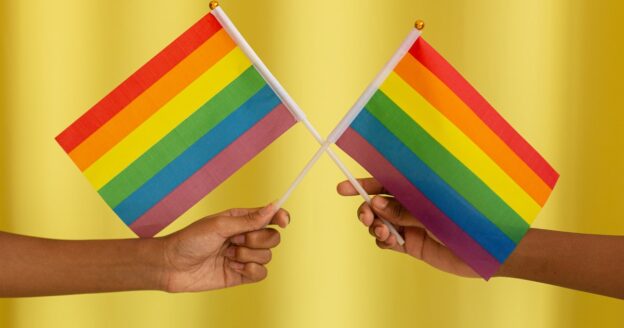People who identify as lesbian, gay, bisexual, transgender or questioning have higher rates of behavioral health issues due to the challenges they face. The LGBTQ+ community is at a higher risk for discrimination, stigma, harassment, violence and other stressors. Due to this, members of the community sometimes turn to drugs or alcohol to cope with the stress.
One of the hardest parts about being LGBTQ+ is not being accepted by friends and family. Being a sexual minority is difficult enough on its own, let alone when you don’t receive support from loved ones. Sadly, many people in this population struggle with depressive symptoms and thoughts of suicide.
It’s important to know the role that family acceptance plays for individuals who identify as LGBTQ+. For instance, were you aware that LGBTQ+ youth who report having at least one accepting adult are 40 percent less likely to report suicide attempts?
Let’s explore the ways you can foster an inclusive and supportive family environment for a loved one who identifies as LGBTQ+.
Recognize the Challenges
LGBTQ+ individuals face unique challenges related to their sexual orientation or gender identity. These challenges can include discrimination, social stigma, rejection and internalized shame. If these issues are not addressed, they can contribute to increased vulnerability to substance use as a way to cope.
By taking the time to understand what the LGBTQ+ community goes through, you can be more understanding and supportive to your loved one. You may assume that your loved one gets enough support, but in reality, only 72 percent of Americans say that homosexuality should be accepted. The U.S. isn’t even in the top ten countries for LGBTQ+ acceptance.
Educate and Challenge Stereotypes
Family members play a vital role in challenging societal stereotypes and prejudices by educating themselves about LGBTQ+ issues. Take the time to learn about diverse sexual orientations, gender identities and the experiences faced by LGBTQ+ individuals. Stereotypes can be harmful and place a significant burden on those affected.
Here are some common stereotypes among LGBTQ+ individuals that are inaccurate.
- Homosexuality is a phase. Usually when someone declares they are lesbian or gay, they’ve known for a long time. ‘Coming out’ takes a lot of courage and self-knowledge, and is not a passing fad.
- LGBTQ+ people are perpetrators of abuse. There is absolutely no evidence to support this. Approximately 90-95 percent of child sexual abuse is committed by heterosexual males.
- Trans people are mentally ill. According to the largest medical organizations, including the American Medical Association and the American Psychiatric Association, being transgender is not a mental illness. “Gender identity disorder” has been changed to “gender dysphoria.”
Foster Open Communication and Dialogue
Open and honest communication is essential for building an accepting and supportive family environment. Encourage your loved one to talk about their sexual orientation and gender identity, and provide a safe space where they can express themselves. This will help your loved one feel like a valued part of the family, reducing the likelihood of turning to substances as a means of escape.
Understand the Importance of Family Acceptance
As mentioned above, The Trevor Project reports that having at least one accepting adult decreases the risk for suicide by 40 percent. Further research shows that individuals who receive acceptance from their families are less likely to engage in risky behaviors, including substance use.
Having a supportive family environment can foster resilience, build self-esteem and enhance overall well-being. Not only does this reduce the risk of substance use, but also mental health disorders, which are also more common among the LGBTQ+ population.
Seek Professional Help and Support
Sometimes, families need additional support to navigate the complexities of substance use prevention and recovery for LGBTQ+ individuals. Consider seeking professional guidance from therapists, counselors or support groups that specialize in LGBTQ+ issues. These resources can provide valuable insights, tools and strategies for fostering family acceptance and supporting recovery.
You may also benefit from one-on-one therapy with a licensed counselor. Many people don’t know how to react to their loved one coming out, and that’s okay. This may be your first experience with LGBTQ+, and you may not know the right things to do and say. It can be helpful to talk to others who have been in your shoes before, and explore your own feelings and concerns.
Create an Inclusive Environment
Ensure that family gatherings and activities are inclusive and welcoming to everyone. While you can’t control what others say and do, you can promote an environment of inclusivity. If extended family and friends cannot be supportive, your loved one does not need to be with them. Being in an environment that is critical and unsupportive can damage their self-esteem and make them more likely to turn to substances for acceptance or escape.
LGBTQ+ Addiction and Mental Health Treatment
Family acceptance is a powerful force in substance use prevention and recovery for LGBTQ+ individuals. By fostering an inclusive and supportive family environment, we can create a space where LGBTQ+ individuals feel accepted, valued and loved.
Awakenings Treatment Center works closely with the LGBTQ+ population, offering mental health and substance use treatment. We combine evidence-based therapies and complementary treatments to help individuals recover from their addiction while receiving support regarding LGBTQ+ issues.
Furthermore, we offer weekly individual family therapy and monthly family day to support our clients’ support systems. Call us today for a free, confidential assessment and discover how Awakenings Treatment Center can support your healing.








